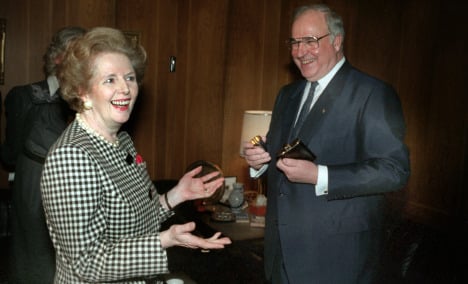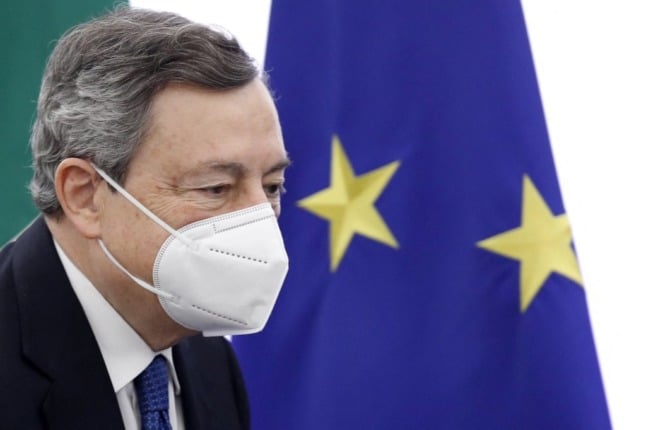Margaret Thatcher would have made an ideal Berlin expat. No one was better at moaning about the Germans. If she’d lived in the city’s überhip Neukölln neightbourhood in 2013, it would only have been a matter of time before she had her own English language stand-up show. The preface of this great book on Anglo-German relations, contains all kinds of top nuggets about Maggie’s Germanophobia: “If Boris Becker wins again this year, Margaret will be hell in cabinet the next day,” one minister is supposed to have said in 1990 as the ginger German went for his fourth Wimbledon crown.
Then there’s the lovely anecdote about when Helmut “I-fear-her-like-the-devil-fears-holy-water” Kohl fed Thatcher his favourite German dish: Saumagen. At the end of an awkward meal in which the gigantic chancellor attempted to impress the PM by swallowing a pig’s stomach, she whispered to an aide, “That man is so German.”
But enough about Thatcher’s positive side. What irritated me about yesterday’s Thatcher “tributes” is all the talk about how “great” she was. “I didn’t like her or agree with her policies,” people said, but she “achieved” so much, and had a “vision” that she had the “courage” to realize.
You keep hearing this mendacious bollocks from normal, slightly left-wing people, the kind of people who are otherwise so healthily cynical about other, less entertaining politicians. But being mad, stubborn and zealous is not the same as being great. She was just a political leader, and like all the other boring grey-suited political leaders we have now and that we love to make fun of and then get to dismiss, she was an amoral opportunist who was forced into making ugly compromises.
So she opposed the brutal dictatorships in Eastern Europe even as she supported the brutal dictatorships in South America, and now Poles love her and Chileans hate her. But morally she’s no better or worse than what Angela Merkel or David Cameron or François Hollande are doing now – selling weapons to Saudi Arabia even as they condemn Iran and Burma. It’s just what you do when you’re in charge. Similarly her economic policies, the so-called “Thatcherism” that apparently changed everything, was, as Germaine Greer pointed out in this article for The Guardian, “a thing of strings and patches” that was “put together, as her public persona was, in response to a series of pressures originating in circumstances beyond government control.” Moreover, “She never defined an overall strategy, developed no theory of the state, had scant regard for democracy, and no scruples whatsoever. Thatcher’s Thatcherism was whatever worked.”
As for her troubled relationship with Germany, British and French diplomatic documents released in 2009 to mark the 20th anniversary of the fall of the Berlin Wall (and to say sorry for opposing reunification), showed that her policy towards Europe was shot through with the exact World War II paranoia of the nuttiest UK Independence Party voter. She was basically convinced that a unified Germany would conquer all.
Those documents showed just how strong WWII consciousness was in those crazy days at the end of the 1980s, when Britain, France, and the US routinely still referred to themselves as “the Allies”. In January 1990 Thatcher’s Foreign Secretary Douglas Hurd was moved to give her this blunt advice: “If the people of the Federal Republic of Germany and the German Democratic Republic decide freely and democratically in favour of unity, there is no way of stopping that, short of military action.”
Elsewhere, Thatcher was quoted by the French ambassador in London describing Kohl as being “capable of anything. He has become a different man. He does not know who he is anymore. He sees himself as the master and is starting to act like it.” So much for “helping to end the Cold War,” as Angela Merkel and Guido Westerwelle gushed yesterday – she basically thought what most tyro expat comedians think about Germans: they’re all Nazis.
This commentary originally appeared on Exberliner’s website here. For more of Konrad Werner’s columns click here.



 Please whitelist us to continue reading.
Please whitelist us to continue reading.
Member comments